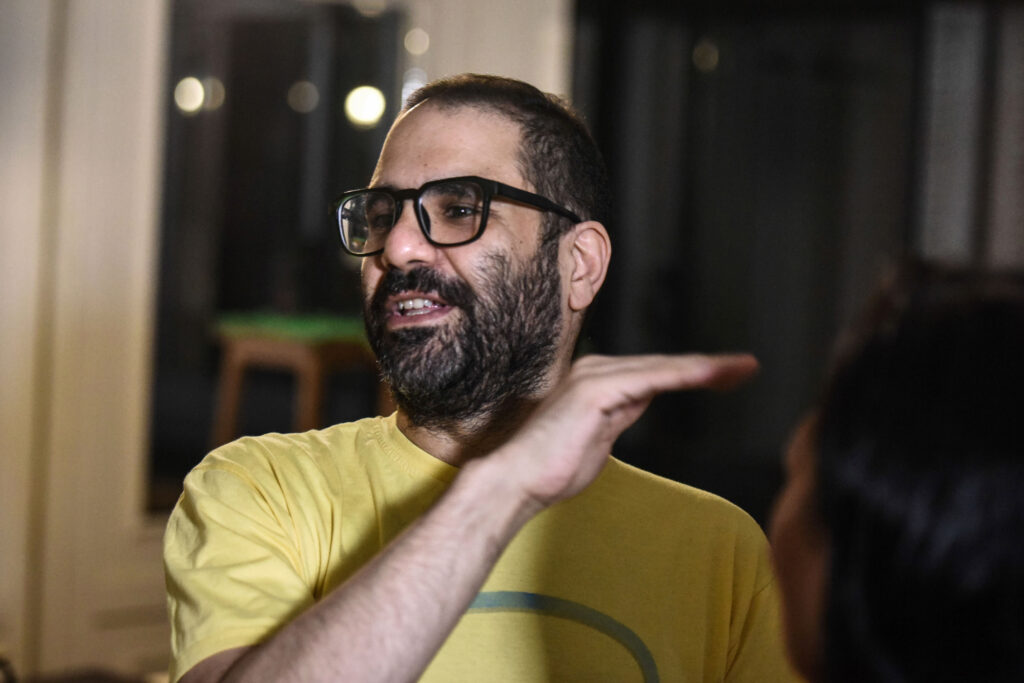AFP Asia Business
Trump warns Hamas, Iran after Netanyahu talks
US President Donald Trump warned Iran of fresh strikes and said Hamas would have “hell to pay” if it fails to disarm in Gaza, as he presented a united front with Israeli Prime Minister Benjamin Netanyahu on Monday.Speaking at a news conference with Netanyahu in Florida, Trump threatened to “eradicate” any attempt by Tehran to rebuild its nuclear program or ballistic missile arsenal following US and Israeli strikes earlier this year.Trump also downplayed reports of tensions with Netanyahu over the second stage of the fragile Gaza ceasefire, saying that Israel had “lived up” to its commitments and that the onus was on Palestinian militant group Hamas.”If they don’t disarm as they agreed to do, then there will be hell to pay for them,” Trump told reporters at his lavish Mar-a-Lago resort. “They have to disarm in a fairly short period of time.”Hamas’s armed wing reiterated earlier on Monday that it would not surrender its weapons.A top political adviser to Iran’s supreme leader on Monday said any aggression against his country would be met with an “immediate harsh response.””Iran’s #Missile_Capability and defense are not containable or permission-based. Any aggression will face an immediate #Harsh_Response beyond its planners’ imagination,” Ali Shamkhani wrote on X.- ‘Productive’ meeting -Netanyahu said his meeting with Trump had been “very productive” and announced that Israel was awarding the US leader its highest civilian honor — the first time it has gone to a non-Israeli citizen.Trump, the self-proclaimed “president of peace,” has been keen to move onto the next phase of the Gaza truce, which would see a Palestinian technocratic government installed and the deployment of an international stabilization force.While some White House officials fear Netanyahu is slow-walking the process, Trump said he had “very little difference” with the Israeli premier and was “not concerned about anything that Israel’s doing.”During their fifth meeting in the United States since Trump’s return to power this year, Netanyahu also appeared to have steered the US leader toward focusing on Israel’s concerns about Iran.Israeli officials and media have expressed concern in recent months that Iran is rebuilding its ballistic missile arsenal after it came under attack during the 12-day war with Israel in June.Trump said Iran “may be behaving badly” and was looking at new nuclear sites to replace those targeted by US strikes during the same conflict, as well as restoring its missiles.”I hope they’re not trying to build up again because if they are, we’re going have no choice but very quickly to eradicate that buildup,” Trump said, adding that the US response “may be more powerful than the last time.”But Trump said he believed Iran was still interested in a deal with Washington on its nuclear and missile programs. Tehran denies that it is seeking nuclear weapons.- Focus on Gaza -Trump and Netanyahu’s talks also focused on other regional tension points, including Syria and the Hezbollah movement in Lebanon.Trump said he hoped Netanyahu could “get along” with Syria’s new president, a former Islamist rebel commander who toppled long-term ruler Bashar-al-Assad a year ago, despite a series of Israeli strikes along their border.Netanyahu’s visit caps a frantic few days of international diplomacy in Palm Beach, where Trump hosted Ukrainian counterpart Volodymyr Zelensky on Sunday for talks on ending Russia’s invasion.The Gaza ceasefire in October is one of the major achievements of Trump’s first year back in power, and Washington and regional mediators have hoped to keep their foot on the gas.The Axios news site said Trump seeks to make announcements as soon as January on an interim government and an international force.But Trump gave few details beyond saying that he hoped “reconstruction” could begin soon in the Palestinian territory, devastated by Israeli attacks in response to Hamas’s October 7, 2023 attacks.The disarmament of Hamas however continued to be a sticking point, with its armed wing again saying that it would not surrender its arms.”Our people are defending themselves and will not give up their weapons as long as the occupation remains,” the Ezzedine al-Qassam Brigades said in a video message.
Israel hands Trump another international award, after Nobel snub
US President Donald Trump will receive Israel’s highest civilian honor in 2026, after Prime Minister Benjamin Netanyahu announced Monday that his country will break with decades of tradition to recognize a non-citizen.Speaking after a cordial Florida meet-up with Trump, Netanyahu said the move reflected “overwhelming sentiment” in Israel in appreciation of the US president’s support for the country. “President Trump has broken so many conventions to the surprise of people, and then they figure out, ‘oh, well — maybe, you know, he was right after all,'” Netanyahu said to reporters.”So we decided to break a convention too or create a new one, and that is to award the Israel Prize.”Netanyahu hailed Trump as Israel’s “greatest friend ever” in October — praise that followed militant group Hamas freeing the last 20 surviving hostages taken in the October 7 2023 attacks, under a Gaza peace deal brokered by Trump and his team.”I have to say that this reflects the overwhelming sentiment of Israelis across the spectrum,” the Israeli leader said of Trump’s award. “They appreciate what you’ve done to help Israel and to help our common battle against the terrorists and those who would destroy our civilization. So again, that’s an expression of thanks and appreciation.”Normally, the Israel Prize is reserved for Israeli citizens or residents, with the lone loophole being a category for “special contribution to the Jewish people.” The only other non-Israeli to have received this version of the honor is Indian conductor Zubin Mehta, in 1991.Trump, clearly tickled, said the award was “really surprising and very much appreciated,” hinting that he might jet to Israel for the ceremony, traditionally held on the eve of the Middle Eastern country’s Independence Day. For Trump, the accolade is another jewel in his self-styled crown as a global peacemaker. In speeches and interviews, he regularly claims — falsely — that he has “stopped eight wars,” portraying himself as uniquely capable of imposing order on global conflicts through his force of personality and deal-making.Trump has long insisted that the Nobel Peace Prize stakes do not faze him — he dusted down the nonchalant refrain when he missed out again in 2025 — while also voicing frustration at being overlooked. This latest award follows Trump recently being granted the FIFA Peace Prize, another nod to his diplomatic ambitions via symbolic validation that still falls short of the Nobel honor he openly covets.
UK orders urgent review after Egyptian activist’s violent posts spark uproar
UK Foreign Secretary Yvette Cooper on Monday ordered an urgent review into what she said were “serious information failures” in the case of a British-Egyptian activist who was awarded citizenship despite “abhorrent” past social media posts.Alaa Abdel Fattah earlier Monday apologised over the resurfaced posts in which he called for violence against Zionists and police, as opposition lawmakers urged the UK government to revoke his citizenship.The posts, dating back to 2010, came to light just days after Abdel Fattah returned to Britain following years of diplomatic efforts by London to secure his release from detention in Egypt.Prime Minister Keir Starmer previously said he was “delighted” he had been reunited with his loved ones. His office has now said he was unaware of the tweets until after he arrived in the country.In a letter to the chair of parliament’s foreign affairs committee later Monday, Cooper said she had ordered a review as it was clear there had been “an unacceptable failure” in the handling of the case.She said this had led to successive ministers and prime ministers, including Starmer, being unaware of the posts when they made public statements.Starmer added in a separate post that the historic tweets were “absolutely abhorrent”.”With the rise of antisemitism, and recent horrific attacks, I know this has added to the distress of many in the Jewish community in the UK,” he wrote.Abdel Fattah apologised in a statement.”Looking at the tweets now — the ones that were not completely twisted out of their meaning — I do understand how shocking and hurtful they are, and for that I unequivocally apologise,” he said.”I must also stress that some tweets have been completely misunderstood, seemingly in bad faith,” he added.Abdel Fattah was a leading voice in Egypt’s 2011 Arab Spring uprising.He was detained in Egypt in September 2019, and in December 2021 was sentenced to five years in prison on charges of spreading false news. He went on hunger strike this March while behind bars and was later released after being pardoned by Egyptian President Abdel-Fattah el-Sisi in September.- ‘Abhorrent’ posts condemned -The foreign ministry on Sunday said it had been “a long-standing priority under successive governments” to work for his release, while condemning the content of the posts.Abdel Fattah was granted UK citizenship in December 2021 when the Conservatives were in power.He obtained it through his British-born mother, who herself went on hunger strike during her son’s imprisonment.”If the Prime Minister really was unaware that El Fattah was an extremist, he should immediately retract his comments expressing ‘delight’ at his arrival and begin proceedings to revoke his citizenship and deport him,” the Conservatives’ justice spokesman, Robert Jenrick, posted on X.Anti-immigrant firebrand Nigel Farage, leader of the Reform UK party, wrote a letter to interior minister Shabana Mahmood urging her to “order” the deportation of Abdel Fattah.”It should go without saying that anyone who possesses racist and anti-British views such as those of Mr el-Fattah should not be allowed into the UK,” Farage wrote.Starmer’s official spokesman told reporters citizenship can only be revoked from Britons who obtain it “by fraud, or against the most dangerous individuals, such as terrorists, extremists and serious organized criminals”.”There is a high bar to meet these thresholds,” the spokesman said.Abdel Fattah arrived in the UK last Friday after Egypt’s attorney general lifted an apparent travel ban.Abdel Fattah was nominated for the European Parliament’s Sakharov Prize in 2014 but the group backing him withdrew the nomination for the human rights award, saying they had discovered a tweet from 2012 in which he called for the murder of Israelis.bur-tc-har-pdh/phz
Egyptian activist sorry for violent posts after UK uproar
A British-Egyptian activist apologised Monday for resurfaced social media posts in which he called for violence against Zionists and police, as opposition lawmakers urged the UK government to revoke his citizenship.The posts, dating back to 2010, came to light just days after Alaa Abdel Fattah returned to Britain following years of diplomatic efforts by London to secure his release from detention in Egypt.British Prime Minister Keir Starmer said he was “delighted” Abdel Fattah had been reunited with his loved ones, but the opposition Conservatives and hard-right Reform UK party called for the activist to be deported.”Looking at the tweets now — the ones that were not completely twisted out of their meaning — I do understand how shocking and hurtful they are, and for that I unequivocally apologise,” Abdel Fattah said in a statement.”I must also stress that some tweets have been completely misunderstood, seemingly in bad faith,” he added.Abdel Fattah was a leading voice in Egypt’s 2011 Arab Spring uprising.He was detained in Egypt in September 2019, and in December 2021 was sentenced to five years in prison on charges of spreading false news. He went on hunger strike this March while behind bars and was later released after being pardoned by Egyptian President Abdel-Fattah el-Sisi in September.- ‘Abhorrent’ posts condemned -The UK foreign ministry on Sunday condemned Abdel Fattah’s earlier posts, describing them as “abhorrent” in a statement.But it added that it had been “a long-standing priority under successive governments” to work for his release.As questions mounted over the handling of the case, Starmer on Monday evening said the government was “taking steps to review the information failures”.”With the rise of antisemitism, and recent horrific attacks, I know this has added to the distress of many in the Jewish community in the UK,” he wrote on X.Abdel Fattah was granted UK citizenship in December 2021 when the Conservatives were in power.He obtained it through his British-born mother, who herself went on hunger strike during her son’s imprisonment.”If the Prime Minister really was unaware that El Fattah was an extremist, he should immediately retract his comments expressing ‘delight’ at his arrival and begin proceedings to revoke his citizenship and deport him,” the Conservatives’ justice spokesman, Robert Jenrick, posted on X.Anti-immigrant firebrand Nigel Farage, leader of Reform, wrote a letter to interior minister Shabana Mahmood urging her to “order” the deportation of Abdel Fattah.”It should go without saying that anyone who possesses racist and anti-British views such as those of Mr el-Fattah should not be allowed into the UK,” Farage wrote.Starmer’s official spokesman told reporters Monday that the prime minister “wasn’t aware” of Abdel Fattah’s posts when he hailed his arrival in Britain.He added that citizenship can only be revoked from Britons who obtain it “by fraud, or against the most dangerous individuals, such as terrorists, extremists and serious organized criminals”.”There is a high bar to meet these thresholds,” the spokesman said.Abdel Fattah arrived in the UK last Friday after Egypt’s attorney general lifted an apparent travel ban.The Freedom for Alaa campaign said the activist had been reunited with his 14-year-old son, who lives in the southern city of Brighton.Abdel Fattah was nominated for the European Parliament’s Sakharov Prize in 2014 but the group backing him withdrew the nomination for the human rights award, saying they had discovered a tweet from 2012 in which he called for the murder of Israelis.bur-tc-har-pdh/phz



